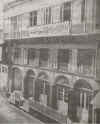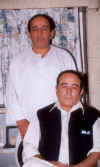|
|
|
||||
|
APRIL 2002 Contents
Travel 'Baikunth'
- the mountain Literature Visual Arts Jatin
Das - 4 decades of Music Zakir
Hussain - Compelling Hakim
Ajmal Khan's ancestral Business & Economy Performing Arts 'Fakir
of Benares' -1922 French Films Revathy
Menon's 'Mitr - my Books 'Knock
at Every Alien Door' People
Books
|
|
|
|||
| print gallery | |||||
|
Page 2 of 2
Sharif Manzil & Hindustani Dawakhana - crumbling memories of India's First Unani family (cntd.) by Sanjeeb Mukherjee Royal Doctors Interestingly, all members of the family of Hakim Ajmal Khan
were Unani doctors. The family had been practicing this ancient form of
medicine from the time of the Mughal rulers. When the Mughal rule came to an
end, these Hakims became doctors to the British rulers of India. Ajmal Khan’s grandfather, Hakim Sharif Khan, who was the
physician of King Shah Alam built the Sharif Manzil, a
hospital-cum-college that taught Unani medicine. The brilliant though
whimsical Hakim had his own set of rigid rules. Women were not allowed to
study here and it was a ‘men only’ institute. Secondly, if any family
member decided to leave the fold and start his own practice he lost any
right to inheritance on Sharif Manzil which was later to become the first
office of the Muslim League in India. However, the place became popular not because of these rules
but because of its philanthropy. For one, no fee was ever charged from poor
patients and all members of the Sharif family were deeply nationalistic. Ajmal Khan first founded the Jamia Millia Islamia University
in Delhi along with the Ali brothers of the Khilafat Movement. He went on to
establish the Tibbia College for higher studies in medicine. To fund the
working of these institutes he established the Hindustani Dawakhana.
Doctors practicing in the Sharif Manzil could recommend medicines only from
the Dawakhana. Sharif Manzil was a very busy hospital and its
dispensary, Hindustani Dawakhana was busier making and giving
medicines to patients. Such was its fame that people were referred for
medicines not just from Sharif Manzil but from other parts of the
country as well. In its hey day in the twenties it clocked sales of over Rs
2 lakhs a month---a mindboggling sum at the time. Most of this went to fund
Jamia Islamia and Tibbia College. The dispensary took out patents for 84 rare herbal formulae.
Some of these like Musafi, Sarbat-E-Sadar, Akise-Nisama, Sekhon and
Hebab-Kebat—are still well known.. According to Shahid Zafar Khan, one of the descendents of
the Hakim and the president of Hakim Ajmal Khan Memorial Society, who now
lives here, "The medicinal formulae were passed on from one generation
to another and they were a closely guarded family secret. Although Unani
medicine was taught at the Sharif Manzil, the concoctions sold at the Hindustani
Dawakhana were known only to family members." Rare Distinction Hakim Ajmal Khan was well-known for his secular views and
also for his expertise in Unani medicine, a tradition which he inherited
from his forefathers who were court physicians from the time of Mughal
Emperor Babar. Ajmal Khan had the rare distinction of being the only Muslim
leader to have been ever elected to a senior post in the Hindu Mahasabha. He
was an expert Quranic scholar well versed in Arabic and Persian. Such was his medical acumen that it is said that he could
diagnose any illness by just looking at a person’s face. The British
rulers were highly impressed by his generosity and medical skill and
bestowed him the twin titles of Haziq-ul-Mulk [philanthropist] and a Qaiser-e-Hind
both of which he later returned as a protest against the British rule. When the popularity of Tibbia College grew it was shifted
from Sharif Manzil to a mosque nearby and from there Ajmal Khan
brought it to Delhi’s Karol Bagh where it is presently located.
Interestingly, Karol Bagh’s most popular area today is called Ajmal Khan
Road. Thought he Jamia Islamia University and the Tibbia College
are thriving, family feuds and Governmental apathy have turned Hindustani
Dawakhana and Sharif Manzil into decrepit buildings. The formulae
of many priceless medicines that had miracle healing powers have long been
lost. The building itself is in tatters. Most rooms that housed the famous
Hakims have been given out on rent and there is a general stench all around. Shelves infested with white ants, empty jars covered with
fungus and broken medicinal gadgets are the only legacy of a place where
some of the world’s best known Unani medicines were made which till date
find mention in all Unani medical books. Descendents of Hakim Ajmal Khan say that ever since the
management went into the hands of Delhi Administration in 1954, the
condition of the place started deteriorating and the buildings went to seed. Earlier, as many as 300 employees served at the Hindustani
Dawakhana now there is only one. Though the Dawakhana is listed in Municipal
Corporation of Delhi’s records as a heritage site, some parts of this
prized building were pulled down a few years ago and priceless books and
formulae for rare medicines were lost or destroyed. _______________________
|
|||||
| Copyright © 2000 [the-south-asian.com]. Intellectual Property. All rights reserved. | |||||
| Home | |||||


